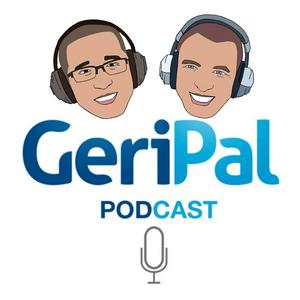Comprehensive Geriatric Assessment: Benefits, Cost-Effectiveness, and Who It Helps Most - Eric Wong and Thiago Silva
In today’s podcast we talk with Eric Wong, geriatrician-researcher from Toronto, and Thiago Silva, geriatrician-researcher from Brazil, about the comprehensive geriatrics assessment. We spend the first 30 minutes (at least) discussing what, exactly is the comprehensive geriatric assessment, including: What domains of assessment are essential/mandatory components of the comprehensive geriatrics assessment? Who performs it? Is a multidisciplinary team required? Can a geriatrician perform it alone? Can non-geriatricians perform it? Who is the comprehensive geriatrics assessment for? Who is most likely to benefit? Eric Widera suggests not as much benefit for very sick and very healthy older adults, more benefit in the vast middle. Why do the comprehensive geriatrics assessment? What are the interventions that it leads to (we cover this more conceptually, rather than naming all possible interventions) How does the comprehensive geriatrics assessment relate to the 4Ms (or 5 Ms)? How long does it take to conduct a comprehensive geriatrics assessment? What’s the evidence (BMJ meta analysis) for the comprehensive geriatrics assessment? What are the outcomes we hope for from the comprehensive geriatrics assessment? That final point, about outcomes, bring’s us to Eric Wong’s study, published in JAGS, which evaluates the cost effectiveness of the comprehensive geriatrics assessment performed by a geriatrician across settings (e.g. acute care, rehab, community clinics). As an aside, as the editor at JAGS who managed this manuscript, I will say that we don’t ordinarily publish cost effectiveness studies at JAGS, as the methods are opaque to our clinical audience (e.g. raise your hand if you understand what ‘CGA provided in the combination of acute care and rehab was non-dominated’ means). We published this article because its bottom line is of great interest to geriatricians. In Eric’s study, geriatricians performing CGA were more cost effective than usual care in Every. Single. Setting. And of course cost effectiveness is only one small piece of the argument for why we do the comprehensive geriatrics assessment in the first place (no patient in the history of the world has ever asked for a test or treatment because it’s cost effective for the health care system). I’ll close with a couple of “mic drop” excerpts from Thiago’s accompanying editorial: Finally, it is instructive to compare the cost-effectiveness of geriatric services and CGAs with other interventions. A recent analysis of lecanemab for early-stage Alzheimer's disease found that gaining one QALY would cost approximately $287,000 (USD). In contrast, Wong et al. estimated that adding community-based CGA would cost about $1203 (CAD) per quality-adjusted life month (QALM) (equating to roughly $10,105 (USD) per QALY, using $1 USD = $0.7 CAD), making geriatrician-led CGA nearly 30 times more cost-effective. Put simply, for each dollar spent to improve quality of life for a year through CGA, one would need to spend almost $30 to achieve the same benefit with lecanemab. Ultimately, the question is not whether geriatricians represent a worthwhile investment (they are) but how healthcare systems can ensure that every older adult requiring specialized, comprehensive care can access it. Wong et al.'s modeling study provides a valuable contribution by showing that geriatricians placed in acute and rehabilitation settings offer the most cost-effective deployment given current workforce limitations. Despite some caveats, the overarching message remains clear: geriatric expertise not only enhances care quality but can also align with health-economic objectives, especially in high-acuity environments. However, we cannot allow an inadequate geriatric workforce to become a permanent constraint, forcing painful decisions about which older adults and which settings will miss out on optimal geriatric care. Instead, we should continue to strive to increase the number of geriatricians through robust training programs and payment model reform to ensure that cost-effective care can be provided for this large and growing vulnerable population. -Alex Smith



